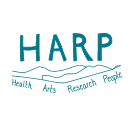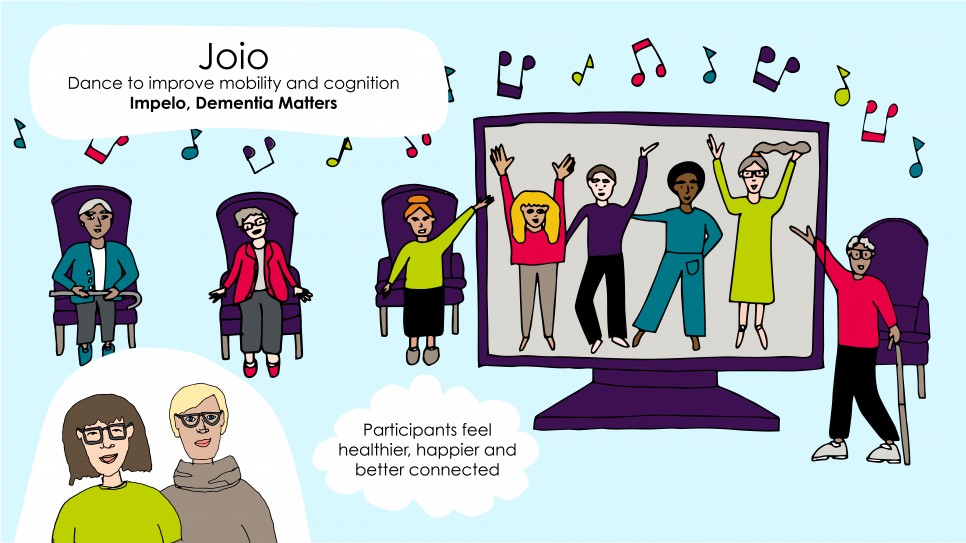Suzy West, Executive Director of Impelo dance charity, reflects on the twists and turns in the journey of HARP project Joio…
The pandemic is expected to have a long-term and wide-ranging impact on people with dementia.
Dramatic changes in routines and rising anxiety exacerbated symptoms and negatively affected the emotional health and wellbeing of people living with the condition, as well as relatives and professional carers.
To support them through this period, in 2021, and with HARP’s support, community dance organisation Impelo partnered with Powys Teaching Health Board and Dementia Matters Powys to develop and build the evidence base around ‘Joio’.
‘Joio’ is a co-designed online and in-person dance programme for older people living with memory issues and their carers. It aims to help them stay happy, healthy and socially connected through dance.
Research is contradictory - some suggesting dancing therapy is contraindicative to, and others that it has a positive impact on, the cognitive, physical, emotional, and social wellbeing of people with dementia. There is a lack of evidence about the creative rather than physical element of dance to impact these areas and we wanted to build that evidence.
At Impelo, we have been working with older people with dementia and memory challenges for a year, but we wanted to scale up our offering through partnerships and by co-designing a programme with participants and their carers that had longevity and was firmly rooted in learning what worked for who and in what circumstances.
We planned to run online and in-person sessions with people living with dementia and their carers, and work with a dementia ward at a local hospital.
We were keen to use HARP to establish Joio’s outcomes on improving mobility and quality of life. We wanted to understand if running these classes, online and in-person, led to people living independently, happily and healthier for longer.
Initially, we ran weekly online sessions for those living with dementia and their carers in Powys. Technology was gifted to those who needed it by Digital Communities Wales and Dementia Matters in Powys helped participants and their carers log in for sessions. Carers were also ‘upskilled’ so they could run mini sessions.
Dealing with the unexpected
Things didn’t go quite to plan.
We reached out to the health board to start building relationships with appropriate wards, such as those managing falls clinics and memory loss clinics. But nurturing a relationship with the health board during the pandemic proved challenging.
The health board was relatively new to arts and health programmes, but we had identified and developed a good relationship with a manager who was an arts and health advocate and believed in our programme.
However, when that manager went on indefinite leave for personal reasons it became challenging to maintain forward momentum.
Its part-time arts and health coordinator was supportive, but their resource and capacity were limited with the health board in business critical mode, and referral pathways were broken because of the pandemic. Staff were receptive to our programme, including those on fall prevention services, but didn’t have the time or capacity to engage with it. The timing for innovation, it seemed, wasn’t quite right.
Things also moved more slowly than we’d anticipated within that formal health structure.
We pressed on with the online sessions, with 90 per cent of participants reporting their mental wellbeing had improved.
But people living with dementia and their carers couldn’t engage with the technology as we’d hoped, even with the support provided through our partner organisations.
Our plans to run in-person sessions at Dementia Matters Powys meeting centres were curtailed by the pandemic, with many closed for the majority of the project’s lifespan. The determination to get those meeting centres open again, despite the precarity of Dementia Matters Powys’ funding, paid dividends and we finally started working with people face-to-face briefly in December before the Omicron variant of Covid-19 saw centres closed again.
We had aimed to run Joio and analyse its economic impact, using that economic impact analysis to advocate a referral pathway from the health board and sustainable funding.
But it became clear we were not going to have the data sample size needed to provide the evidence sought, so we rethought our evaluation.
From challenge to opportunity
Impelo is entrepreneurial in approach and spirit, so we turned our attention to the resources and relationships we knew we could nurture.
We believe in genuine, participant-centred processes. While we couldn’t work on dementia wards or with the falls prevention clinics during the lifespan of the project, we worked with its physiotherapist to develop a methodology that has a strong creative element often missing from dance projects for older people, particularly those with dementia. The methodology is ready to roll out.
We believe in genuine, participant-centred processes
We applied for HARP funding because we wanted to learn about research, evidence, and evaluation. Peer-to-peer learning through HARP, input from Joio participants’, advice from HARP partner Cardiff University, and advice from Swansea and Bangor universities meant we developed Impelo’s co-designed approach to evaluation for arts and health generally. That was fun for people to engage with and had robust consent, standardisation and ethics to ensure credibility when evidencing Joio’s impact on people’s happiness and social connection.
We turned the attention of our evaluation to the process, namely, how best to develop and roll out our project in the future, because our experience has been so rich in learning. We also developed working principles, which were unplanned but useful and iterate how we engage with people through dance to create positive health changes.
Much of what we had aimed to do will be achieved in the months ahead.
Through this project, we have developed the groundwork, if not the evidence we had hoped for, to scale our work.
We have an excellent working relationship with Dementia Matters in Powys. They saw the value of the economic impact analysis and we are seeking funding for us to do that together. We are also part of a UK-wide research project looking at rural provision for people living with dementia.
And our reputation with the health board is flourishing. I have been commissioned to run an arts and health conference as well as a cancer project, which demonstrates a growing trust.
We also hope Impelo will partner with other HARP projects in the future, such as Digital Threads, which offers singing workshops for people living with dementia in hospital.
Joio was a multi-partnership HARP Nourish project between dance organisation Impelo, Powys Teaching Health Board and Dementia Matters Powys

